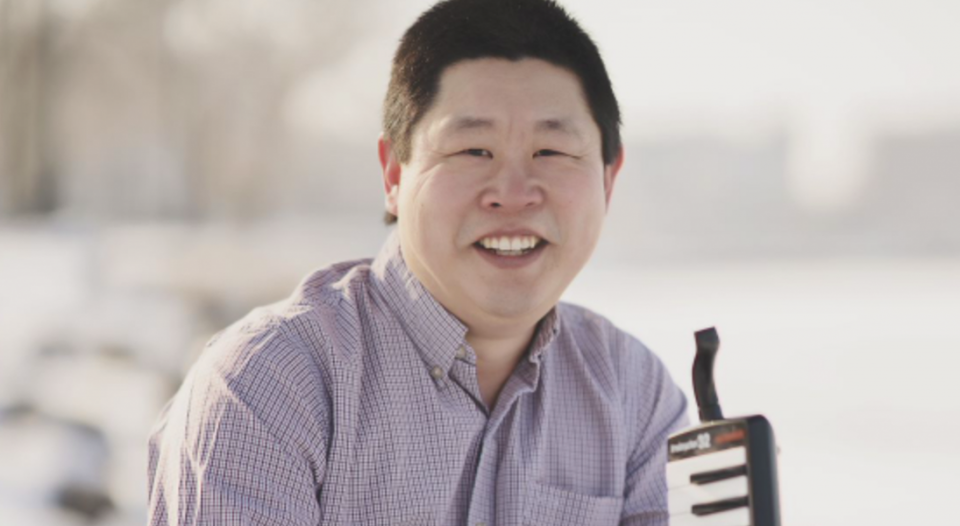English Lutheran Church, La Crosse, Wis.
Math professor at the University of Wisconsin–La Crosse; member of the university social justice team, the La Crosse Area Synod anti-racism team, and the synod’s bishop election committee; and congregational musician and worship council member
One of the first things I did when I landed my dream job at the University of Wisconsin–La Crosse was find a church. I wanted to find an LGBTQIA+-affirming church where it was easy to get involved—someplace where people love God and love people in an overarching sense.
I didn’t grow up Lutheran, but I did grow up going to church. Being part of English Lutheran and the ELCA has given me a lot of opportunities to be challenged to welcome others. How can I be part of lovingly challenging the ways in which systems promote tacit racism? It’s been surprisingly good to be a challenger: I’m using my voice and my words to make things more accessible and inclusive.
God shows up in my work as a math professor when I have to call a student in. Rather than start with their grade, I’ve learned to say, “It seems like this class isn’t going well. Has something happened? Is there anything you need to tell me?” I get to hear their stories and understand where they’re coming from. Many of them turn around, though not always academically. I have former students who email: That was an important time in my life when things weren’t going right. It was nice to be heard by you.
When I started here, I didn’t think it was very important for me to say something about myself in class. As the years moved on, I started sharing more with my students. I start class by telling them how I picked up swing dancing. I ask, “What does it take for someone with no skills in this area to learn?” It’s useful to remind people they can do things. Anybody can learn calculus. You just have to expect something of yourself.
Around the same time I picked up swing dancing, specifically the Lindy Hop, I started getting into playing piano in worship. I’ve been told I move a certain way when I play. I hesitate to use the word “perform” in the church setting. For me, it’s just leadership. Whenever I’m up there, I know I have an important role and responsibility in leading people to connect to God and each other.
Rather than start with their grade, I’ve learned to say, “It seems like this class isn’t going well. Has something happened?”
I went on two mission trips to Thailand and brought along a melodica. You blow into this thing and it seems like an accordion, but you play it like a piano. It’s neat to go to a place where there’s a huge language barrier and just jam out on instruments—there’s a certain, ineffable joy that comes from that connection.
There are people of faith in academia. And living out faith doesn’t mean that everybody becomes a pastor. It means figuring out how to serve the people you have around you, whatever that looks like.
I pray for the brokenness that we have. I pray for this lack of unity in a political sense and a growing mental health crisis.
If I see something on campus that’s not OK, I speak up about it. My foray into social justice began with my chairing the university’s Joint Multicultural Affairs Committee. I help run a workshop on inclusive teaching for faculty members from various disciplines. We’re figuring out how we can be better advocates for our students and serve them better on an individual level.
I draw a lot of inspiration from my old high school math teacher in the way I talk to my students. Her name was Jan Canfield. Because of the arrangement of our high school, I was in a cohort with a bunch of students who didn’t like studying math. To watch her play this really nurturing role and do everything she could to convince everyone that math is fun—that was helpful.
We are a very liturgical congregation with a huge open mind for worship. To be able to bring in a tune from the Beatles or James Brown or to take a beautiful ancient Lutheran hymn and do something modern with it is fun.
I share my faith on Facebook. I want to paint a picture that says not all Christians are close-minded and ultratraditional. I’m very open about what I’m supporting on campus, including our pride center. A colleague noticed my posts and asked, “Is your church OK with that?” I said to her, “There are pockets within my denomination that don’t support this, but by and large, people do. This is who I am. I am the same person you see on campus as I am in church.”
Grace is a good gift that we receive from God and hopefully give to each other just because we’re human.
I’m a Lutheran because my church gives me the freedom to love others the way Jesus loved while authentically dealing with the theological “both/and” aspects of Lutheran theology. Life is messy, and so our faith is messy, and that’s OK. That’s why we have each other and a God that gives out a lot of grace.
If you’d like to nominate someone for “I’m a Lutheran,” email erin.strybis@elca.org.





